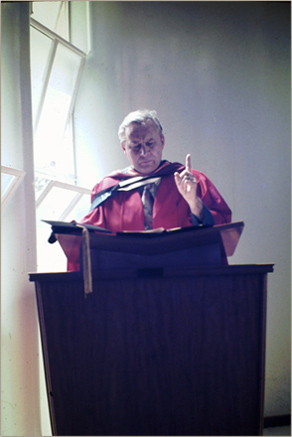1. The Triune God alone is Sovereign (Gen. 1:1-26; John 17:1-24; 15:26f).
2. The Triune God will not share His Sovereignty with any creature (Isa. 40:9-26).
3. Before the Triune God, the universe, the Church, the nation, and all Christian leaders pale into utter insignificance. All of them are merely “unworthy servants.”
4. The doctrine of the Sovereignty of the Triune God is by far the most fundamental doctrine of the Christian faith. All other Christian doctrines are utterly and completely dependent upon the doctrine of the Sovereignty of the Triune God. The important doctrines of the incarnation of Christ and of the salvation of man, for example, are therefore definitely not of the most primary importance.

